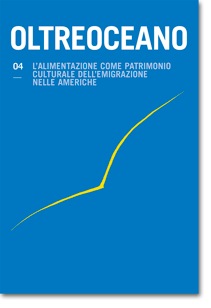Mangiare la foglia: metafore del cibo nella letteratura femminile d’emigrazione
Keywords:
cibo, memoria, migrazione, donne, Ana María Shua, Márgara RussottoAbstract
Il cibo è elemento sempre presente nella trasmissione di affetti, riti, abitudini, ricordi, legati all’emigrazione e tramandati di generazione in generazione. Lo mostra, la prosa di José Pedro Díaz, in cui il cibo si collega immediatamente all’isotopia della povertà, e della nostalgia. A partire dal XX secolo nella scrittura delle donne migranti al di là del rimando alla regione di appartenenza, al ceto sociale, alla condizione economica, vi è sempre un surplus di significato, qualcosa di più profondo e intimo come appare dall’opera di Ana María Shua e di Márgara Russotto.
Wake up and Smell the Coffee: Food Metaphors in Migrant Women's Writing
Food is always present in the transmission of affections, rituals, customs and memories linked to emigration and passed down from one generation to the next. This is, for instance, shown in José Pedro Díaz’s prose where food is linked with the isotopy of poverty and nostalgia. From the 20th century onwards in the works of migrant women like Ana María Shua and Márgara Russotto there is a surplus of meaning ‒something more intimate and profound ‒which goes beyond references to one’s region of provenance, social class or economic status.
Downloads
References
Castellanos, R. (1984): Lección de cocina, pp. 1-14. Recuperato da http://www.materialdelectura.unam.mx/index.php?option=com_content&task=view&id=42&Itemid=30&limit=1&limitstart=3
Chieffallo, D. (1994): Cilento oltre oceano. Acciaroli (Sa): Centro di promozione culturale per il Cilento.
Chieffallo, D. (1999): Le terre dell’abbandono. Acciaroli (Sa): Centro di promozione culturale per il Cilento.
Cruz, Sor Juana Inés de la (1996): Respuesta a sor Filotea de la Cruz. México: Fontamara.
De Amicis, E. (1991): Sull’oceano. Como-Pavia: Ibis.
De Martino, E. (1975): Mondo popolare e magia in Lucania. Roma-Matera: Basilicata.
Díaz, J.P. (1964): Los fuegos de San Telmo. Montevideo: Arca.
Gentile, B. (2006): Como agua para chocolate: la cocina literaria de Laura Esquivel. In Á. Encinar E. Lofquist & C. Valcárcel (Eds.), Género y géneros: escrituras y escritoras iberoamericanas (pp. 23-31). Madrid: Universidad Autónoma.
Grillo, R. M. (Ed.), (1999): Italia-Uruguay: Culture in contatto. Napoli: ESI.
Bosse, M.; Potthast, B. & Stoll, A. (Eds.), (1999): La creatividad femenina en el mundo barroco hispánico. Bielefeld: Reichenberger.
Lara, L. F. (1991): Diccionario básico del español de México. México D.F.: El Colegio de México.
Llarena, A. (1996): Discursos para la autenticidad: narradoras hispanoamericanas de las últimas décadas. Vector Plus. Revista de la Fundación Universitaria de Las Palmas, 9, pp. 22-31.
Martini, V. (1986): Taccuino del vagabondo. Archivio Diaristico Nazionale di Pieve di Santo Stefano.
Meo Zilio, G. (1989): Estudios hispanoamericanos. Temas lingüísticos. Roma: Bulzoni.
Romano, R. (1994): Paese Italia. Venti secoli di identità. Roma: Donzelli.
Rossiello, L. (1999): Huellas itálicas en en grotesco ricciano. In R. M. Grillo (Ed.), Italia-Uruguay: Culture in contatto (263-279). Napoli: ESI.
Russotto, M. (2005): Obra poética. Mérida: El otro@el mismo.
Russotto, M. (2005): Extasis. In M. Russotto, El diario íntimo de Sor Juana, 2002, Obra poética (pp. 247-248). Mérida: El otro@el mismo.
Russotto, M. (2005): De imprecisa fecha. In M. Russotto, El diario íntimo de Sor Juana, 2002, Obra poética (p.253). Mérida: El otro@el mismo.
Russotto, M. (2005): El manual de los Inquisidores. In M. Russotto, El diario íntimo de Sor Juana, 2002, Obra poética (p. 254-255). Mérida: El otro@el mismo.
Russotto, M. (2005): Anotado en los márgenes de un libro de astronomía del Padre Eusebio Kino. In M. Russotto, El diario íntimo de Sor Juana, 2002, Obra poética (p. 249). Mérida: El otro@el mismo.
Russotto, M. (2005): La hermana menor. In M. Russotto, El diario íntimo de Sor Juana, 2002, Obra poética (p. 250). Mérida: El otro@el mismo.
Russotto, M. (2005): Instantes domésticas, 3. En M. Russotto, Restos del viaje, 1969. Obra poética (p.11). Mérida: El otro@el mismo.
Russotto, M. (2009, Sett.): Lettera diretta a Rosa Maria Grillo.
Russotto, M. & Aguilar, A. (2005): Herbario. Madrid: Torremozas.
Sabat de Rivers, G. (1999): Imaginería mecánica en el Sueño de Sor Juana Inés de la Cruz. In M. Bosse, B. Potthast, & A. Stoll (Eds.), La creatividad femenina en el mundo barroco hispánico (pp. 611-628). Bielefeld: Reichenberger.
Shua, A. M. (1994): El libro de los recuerdos. Buenos Aires: Sudamericana.
Van den Bossche, B. (2000): Il cibo nella narrativa del Novecento: appunti per una tipologia. In B. Van den Bossche, M. Bastiansen & C. Salvadori Lonergan (Eds.), Soavi sapori della cucina italiana (pp. 483-496). Firenze: Franco Cesati.
Downloads
Published
How to Cite
Issue
Section
License

This work is licensed under a Creative Commons Attribution-NonCommercial-ShareAlike 4.0 International License.
The authors undertake to comply with the following conditions, which are considered accepted at the time of submission of their contributions.
The sending of a text implies that it is unpublished and not submitted to be published elsewhere.
1. If accepted, the author shall confer on the publisher the right to publish and distribute it both in paper form and in the online electronic edition. The published articles will be downloadable and made available in open access.
2. Provided that it correctly indicates that the first publication took place in the journal Oltreoceano. Rivista sulle migrazioni the author has the right to: a) reproduce the article in separate extracts or collected in a volume; b) publish the article on their personal website or teaching site provided that these sites are of a non-commercial nature; c) deposit the article in online archives of a non-commercial nature, linked to the institution they belong to or as part of projects for the non-commercial dissemination and open access of scientific works.
The use of contributions by third parties, for commercial or otherwise unauthorized purposes, is not allowed. The publisher declines all responsibility for the unauthorized use of the material published in the journal.












